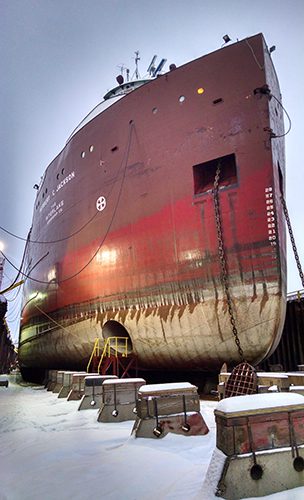By Dan Patrinos
This year U.S.-flag Great Lakes shipping companies will invest nearly $87 million in their vessels at shipyards and facilities, according to the Lake Carriers’ Association.
That includes over $36 million in Wisconsin, $33 million in Ohio, $13 million in Pennsylvania, and over $4 million in Michigan. The association said the work includes replacing steel plating, engine overhauls, navigation equipment updates, and conveyor belt repairs and replacements.
In a statement, the association said that the conveyor belt work is critical because the U.S. Great Lakes fleet of ships can unload massive amounts of bulk cargo without shoreside assistance. The self-loading technology allows a 1,000-foot ship to unload 70,000 tons of cargo in eight hours, per the association.
“A ship can arrive in the middle of the night with cargo at any number of Great Lakes port facilities, unload before sunrise, and shoreside workers awake to a huge stockpile of raw material critical to their operations positioned perfectly on the dock,” Jim Weakley, president of the association, said in the statement.
The association reported that the annual maintenance work performed at Great Lakes shipyards permits ships that are forty and fifty years old, and some older, to continue to sail the Great Lakes.
–––––––––––
Visit us on Facebook
–––––––––––
“The freshwater of the Great Lakes allows vessels to sail for decades while ocean carriers must completely replace their vessels frequently due to the corrosive nature of saltwater and a system built around disposal and replacement over maintenance, unlike the Great Lakes fleet,” the statement said.
The Lake Carriers’ Association represents U.S. owned, operated and crewed Great Lakes vessels. The fleet on the Great Lakes can move more than 90 million tons of cargo annually, per the association. This includes iron ore, stone, coal, cement, and other dry bulk materials such as grain, salt, and sand. The association has represented U.S.-flag vessels since 1880.
The association also reported that Great Lakes iron ore shipments totaled 2.6 million tons in January, an increase of 43.5% compared to a year ago. The following chart shows the iron ore tonnage from 2016 to 2021 and the five-year average:
––––––––––––––––––––––––––––––––––––––––––––––––––––––––––––––––––––––––––––––––––––––––––––––––––––––––
Great Lakes Iron Ore Shipments: January 2016-2021 & 5-Year Average
Includes Transshipments to Quebec City for Shipment Overseas
(net tons)
| Port | 2016 | 2017 | 2018 | 2019 | 2020 | 2021 | Average 2016-2020 |
| Duluth, MN | 72,818 | 227,655 | 102,563 | 444,204 | 166,229 | 292,543 | 202,694 |
| Superior, WI | 467,021 | 198,186 | 463,581 | 464,504 | 476,153 | 661,488 | 413,889 |
| Two Harbors, MN | 937,401 | 720,447 | 514,295 | 892,077 | 420,961 | 1,015,888 | 697,036 |
| Silver Bay, MN | 23,810 | 127,730 | 80,862 | 32,795 | 220,792 | 145,983 | 97,198 |
| Presque Isle, MI | 113,040 | 403,963 | 138,146 | 316,837 | 272,367 | 420,526 | 248,871 |
| Escanaba, MI* | 279,016 | 356,801 | 0 | 0 | 0 | 0 | 127,163 |
| Cleveland, OH** | 60,627 | 145,817 | 204,432 | 107,904 | 210,951 | 50,466 | 145,946 |
| Ashtabula, OH | 0 | 47,124 | 0 | 162,056 | 55,369 | 28,553 | 52,910 |
| Conneaut, OH | 0 | 0 | 0 | 0 | 0 | 0 | 0 |
| Total | 1,953,733 | 2,227,723 | 1,503,879 | 2,420,377 | 1,822,822 | 2,615,447 | 1,985,707 |
––––––––––––––––––––––––––––––––––––––––––––––––––––––––––––––––––––––––––––––––––––––––––––––––––––––––
* Dock ceased operations in April 2017
** Transshipments within Cleveland Harbor
The Lake Carriers’ Association has this disclaimer: Information is based on data from knowledgeable sources.
However, accuracy cannot be guaranteed. Lake Carriers’ Association assumes no legal responsibility for the
outcome of decisions or commitments made on the basis of this information. Report represents the views of
Lake Carriers’ Association and may not necessarily represent the views of its individual members
* * *
Photo: HERBERT C. JACKSON at Fraser Shipyards, Superior, Wisconsin, 2016. Credit: Lake Carriers’ Association
Dan Patrinos is a retired journalist. He lives in Milwaukee and is a member of the Wisconsin Marine Historical Society.

